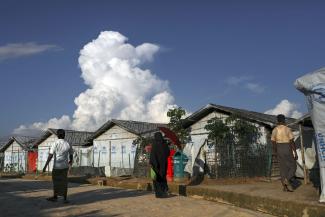Rohingya
Frozen repatriation

The Rohingya, a mostly Muslim ethnic minority traditionally living in Myanmar’s northern state of Rakhine, are one of the most victimised groups of today’s world. They are denied basic rights in Myanmar and have been displaced by ethnic violence time and again (also see Ridwanul Huque and Ashraful Azad in D+C/E+C e-Paper 2019/04, Focus section). The latest wave of Rohingya arrived in Bangladesh in 2017, raising their number in this country to around a million.
Bangladesh’s response was generous and timely, sheltering refugees and providing for their basic needs. The response has been praised by the international community. However, the empathy of host communities and the government of Bangladesh is gradually withering away. The governments of Bangladesh and Myanmar started two repatriation attempts, but both were unsuccessful because the Rohingya were – and are – too afraid to return.
The reasons for their reluctance are obvious.
First of all, since the military-led violence in 2017, the destruction and burning of remaining Rohingya villages continued throughout last year. In their place, new homes are being built by Myanmar’s other ethnic groups.
Second, representatives of the Rohingya have made it clear that the main prerequisites for returning are to be granted the right to citizenship and freedom of movement. On the contrary, Myanmar offered only National Verification Cards (NVC), usually issued to foreigners, and life in containment camps euphemistically called “reception centres”.
Most of the refugee camps in Bangladesh are in Cox’s Bazar, where the mass of displaced Rohingya now outnumbers the local population. Overcrowding means encroachment of forests and environmental degradation, high commodity prices and decreasing opportunities for making money. The purchasing power of the host communities is declining. Moreover, criminal gangs are increasingly targeting the Rohingya – for drug-peddling, human trafficking et cetera. The tensions between the host community and the refugees are now reaching an alarming level.
Since the second failed repatriation attempt in August 2019, it is palpable that some sections of the media and civil society are casting a bad light on the Rohingya. However, we have observed Rohingya en masse expressing their gratitude towards the Bangladesh government and the host community. Various interest groups in, around and outside the camps are pulling various strings. In the era of social media, rumours spread fast, fuelling the frustration of the host community and the Bangladeshi government. There is a potential risk of serious conflict, particularly where Rohingya now live in close contact with host communities. All stakeholders are facing major challenges.
Up until now, there is no guarantee that Rohingya returning to their homeland will escape state persecution, abuse or atrocities of the kind that made them flee in the first place. It is indisputable that the Rohingya must be repatriated with safety and dignity. China, India and Russia are staying apparently silent, however, and thus protract the crisis. Symbolic empathy from other major global players is not leading to any effective solution either. While support from numerous humanitarian actors has so far kept the refugees alive, tensions may explode soon. If the crisis is not revolved, it may morph into an issue of global security.
Mohammad Ehsanul Kabir is a Senior Research Assistant at the University of South Wales.
cyberehsan@gmail.com
Palash Kamruzzaman is a Senior Lecturer at the University of South Wales. Together, they did six months of research fieldwork in several Rohingya camps in Bangladesh. This research is ongoing and funded by the British Academy.
p.kamruzzaman@gmail.com







